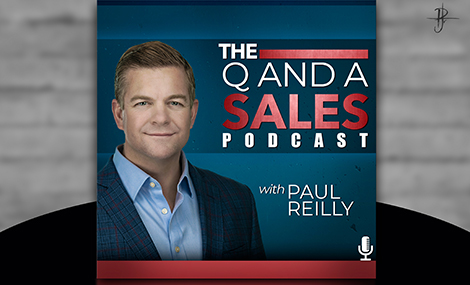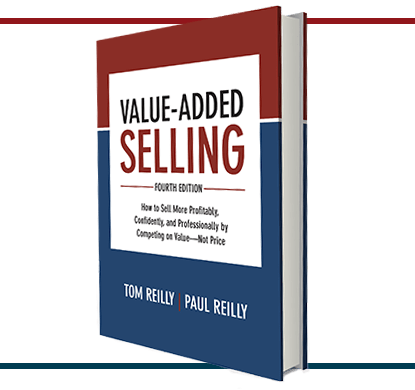Paul discusses the importance of the sales process from a seller standpoint as well as the leadership standpoint.
Show Notes:
Selling is neither easy nor predictable. Having a sales process will guide you. Trust the process.
A sales process gives you structure to progress the sale forward.
Are you struggling? A sales process will help you identify the phase at which your sales are stalling so that you can dig deeper, train, and address the issue.
As a sales leader, you can more effectively coach your team. A sales process will help you identify where your folks are struggling.
Select-Pursue-Discover-Persuade
***
Did you enjoy the podcast? Go to Apple Podcasts to rate/review the podcast: https://podcasts.apple.com/us/podcast/the-q-and-a-sales-podcast/id1485103513. Click “Listen” then the “ratings and reviews” button.
Visit www.ToughTimer.com to get started on the 30-Day Tough-Timer Challenge!
Order your copy of Selling Through Tough Times from Amazon or Barnes & Noble!
Click here to purchase the latest edition of Value-Added Selling!
Interested in our public seminar offerings? Click here to learn more.
***
Thank you for tuning in. Our show is updated weekly with the questions you ask. So, please go to the home page to ask the question that you want answered.
Thank you to our production team at The Creative Impostor Studios.
Be sure to follow our show in your favorite podcast app and share this episode with a colleague or friend.
And most importantly…make it a big day.
Why is a sales process important?
(Transcribed from podcast)
On today’s episode, we’re going to talk about the importance of a sales process. And really, what sparked this episode, I had a conversation with a group of sales leaders just the other day. And it became very clear in that conversation that many of their salespeople are just kind of doing their own thing. You think about how often that happens. Salespeople, they start to experience some success. There’s a good economy—they get a little lackadaisical on how they approach customers and prospects. Things just kind of happen. When everyone’s out there just kind of doing their own thing, it’s hard to manage and lead in that environment. So we’re going to talk about the importance of process—why it works. And also, I’ll share a few quick ideas on how to create one if you currently don’t have a sales process for your team to follow.
Now, before I get into that, you know, we’ve a couple of different processes here at our company. We teach the Value-Added Selling Process® and the Selling Through Tough Times process. I can tell you that both are great systems. Whether you’re in good times, whether you’re in tough times, whether you’re in a price-sensitive market or more of a value driven market, the key is, you want to implement a process that makes sense for your company. Now, if you want to learn more, about the Value-Added Selling Process® or Selling Through Tough Times, pick up your copy of each book. Value-Added Selling is available wherever you get your books. Same with Selling Through Tough Times. Selling Through Tough Times may be a little more relevant. I recently was at a trade show and I heard an economic forecast predicting a recession beginning in Q3 of this year—2023—extending into 2024. So, if it were me, I’d pick up the Tough Times message now.
So let’s get back to that. Why is process so important? Number one, let’s think about selling in general. Selling has never been an easy profession. It’s never been a highly predictable profession. I say that relative to other business disciplines. When you think about finance, you can follow a process in finance and you are going to get a predictable result.
Think about operations, if you have a manufacturing process and you follow that process to a T, you are going to get predictable results. So, yes, process and business, they run hand in hand. But selling is really the most unpredictable because you can do everything right in your process and the customer still doesn’t buy. That level of uncertainty can damage our confidence. And what we need is we need something to guide us. That is what a sales process will do. And you hear the term, trust the process. Trust the process. You hear that phrase—it is so applicable to sales because, in general, when you follow your sales process, you are going to be more successful.
So what is a sales process? Well, it’s a series of steps that salespeople go through from the moment they identify a target, and then the steps they go through to bring that prospect into fruition. We need to outline—what are those steps? How do they work? What are those objective small wins along the way that are going to get us there? That’s what sales process is. It’s a sequence of steps that produces a visible and predictable result. So that’s why, during uncertain times, during tough times in selling, having a process to rely on is critical.
Now, process also helps you structure your activity. So often I hear salespeople say, “Man, I’ve been working on this prospect. You know, I’ve given my proposal. I don’t know what to do next. I’m not sure what I should be doing at this phase to progress the sale forward.” And when I hear that, the question they have is really rooted in a deeper issue. And that issue is, they don’t have a steady process that they can follow. They’re not sure what to do at this point. They’re not aware of the small steps they need to take to progress the sale forward. So, structure helps guide your activity.
Imagine having a hundred prospects right now in your pipeline. You’ve got all these prospects, all these relationships that you are trying to manage. It can be overwhelming. But if you know exactly where each one of these prospects are in your sales process, then in turn, you know exactly what you need to do to move the sale forward. So again, structure is critical.
Not only this, a systematic sales process helps you identify where you are struggling. That is so important. You’re able to identify where you struggle. For example, let’s say again, you’re working on a hundred prospects, and you notice that about half of your prospects get stalled out right at the presentation phase. Meaning, you just presented your solution, and the customer goes silent or they stall out and it takes longer to close the deal. That is symptomatic of something going on. And maybe that means you’re not effectively having good discovery with that client. You’re not gaining an in-depth understanding of their needs. You’re not properly establishing the need for your solution. And perhaps you’re not presenting it in a compelling enough way that will motivate that buyer to move forward. So the value of a process is you can take a look at each one of the stages in your sales process and say, “Okay, where are my deals clogged up? Why is there a traffic jam right here in this phase?” Then you can dig deeper, then you can train; then you can develop.
And the same is true with sales leaders. As a sales leader, one of the core reasons to have a process is because you can more effectively coach your team. You lead your people, but you manage the process. When you’re managing the process, that’s going to help you identify where your team needs to improve and get better. So guys, having a sales process is critical.
And what I want to do with the final few minutes here is give you a basic sales process. I think sometimes we may get a little too complex on every detail of a sales process, so I wanted to share just a couple thoughts.
Number one: selling is, first of all, about identifying the right targets. So in any good sales process, the first step is to identify, okay, who are my viable sales targets? The next step—okay, I need to go out there and pursue those viable targets. That means you meet with all the right people. Step number three is you have an in-depth discovery or needs analysis. This is where you are uncovering that customer’s needs, wants, and concerns. And then finally, once you identify those needs, wants, and concerns, then you persuade that buyer—you persuade them. You use your techniques to convince them that your solution is the solution that they should utilize moving forward.
Now you can get as granular as you would like, but every good sales process has those four basic qualities: identify the targets, meet with all the right people, uncover their needs, and persuade them. Every good process follows that.
Now, the other thing we should focus on is what happens on the tail end of the sale. So once you do persuade that buyer, how do you continue to build relationships and partner with that customer after the fact? Okay, so you think about it. Once you persuade them, now you’re just beginning this journey with your new customer. This is where we continue to build relationships. We look for ways to create even more value. Then finally, we want to leverage that and grow it into additional opportunity.
So when you’re thinking about what your sales process looks like from cradle to grave, end to end, just remember to keep those steps in mind. The first four I mentioned are more offensive selling: identify targets, meet with the right people, uncover needs, and persuade. The latter three that I mentioned are more defensive selling: relationship building, creating more value, and then leveraging it into additional opportunity. Those basic seven steps, if you can nail those, if you can crush them, you’re going to have a good business. Following those seven steps will keep you on track.
Make it a big day.


